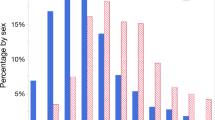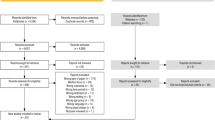Above all else, predictive genetic testing provides information. Gaining insight into the psychosocial effects of this information is a primary goal of genetic counseling. For individuals utilizing predictive genetic testing, the acquisition of genetic information requires choices regarding disclosure within the family. This study uses a phenomenological methodology to explore the contrasting choices of two sets of HD parents regarding the disclosure of genetic risk status to their children. Additionally, the children (now adults) discuss their lived experience growing up with contrasting disclosure dynamics, and their current views regarding the use of predictive genetic testing for themselves. The primary finding of this study is that all of the adult children now express preference for early disclosure of genetic risk and an open/supportive communication style regarding HD. This finding has value for clinicians working with HD families who must make decisions regarding disclosure issues related to predictive genetic testing.
Similar content being viewed by others
References
Agan, N., & Gregg, A. R. (2002). Elements of a genetics counseling service. Obstet Gynecol Clin North Amer, 29, 255.
Bowen, D. J., Bourcier, E., Press, N., Lewis, F. M., & Burke, W. (2004). Effects of individual and family functioning on interest in genetic testing. Commun Genet, 7, 25.
Broadstock, M., Michie, S., & Marteau, T. M. (2000). The psychological consequences of predictive genetic testing: A systematic review. Eur J Hum Genet, 8, 731.
Brouwer-DudokdeWit, A. C., Savenije, A., Zoeteweij, M. W., Maat-Kievit, A., & Tibben, A. (2002). A hereditary disorder in the family and the family life cycle: Huntington disease as a paradigm. Fam Proc, 41, 677.
Bury, M. R. (1991). The sociology of chronic illness: A review of research and prospects. Sociol Health Illness, 13, 451.
Chaffee, S. H., & McLeod, J. M. (1972). Adolescent television used in the family context. In G. A. Comstock & E. A. Rubinstein (Eds.), Television and social behavior: Volume 3. Television and adolescent aggression (DHEW Publication No. HSM 72-9058, pp. 149–172). Washington, DC: US Government Printing Office.
Chapman, E. (2002). Ethical dilemmas in testing for late onset conditions: Reactions to testing and perceived impact on other family members. J Genet Counsel, 11, 351.
Chapman, E., & Smith, J. A. (2002). Interpretative Phenomenological Analysis and the new genetics. J Health Psychol, 7, 125.
Croyle, R. T., & Lerman, C. (1999). Risk communication in genetic testing for cancer susceptibility. J Nat Cancer Inst Monogr, 25, 59.
d’Agincourt-Canning, L. (2001). Experiences of genetic risk: Disclosure and the gendering of responsibility. Bioethics, 15, 231.
Dawson, S., Kristjanson, L. J., Toye, C. M., & Flett, P. (2004). Living with Huntington's disease: Need for supportive care. Nurs Health Sci, 6, 123.
Evers-Kiebooms, G., Nys, K., Harper, P., Zoeteweij, M., Durr, A., Jacopini, G., et al. (2002). Predictive DNA testing for Huntington's disease and reproductive decision making: A European collaborative study. Eur J Hum Genet, 10, 167.
Forrest, K., Simpson, S. A., Wilson, B. J., van Teiflingen, E. R., McKee, L., Haites, N., et al. (2003). To tell or not to tell: Barriers and facilitators in family communication about genetic risk. Clin Genet, 64, 317.
Hagoel, L., Dishon, S., Almog, R., Silman, Z., Bisland-Becktell, S., & Rennert, G. (2000). Proband family uptake of familial-genetic counseling. Psychooncology, 9, 522.
HDSA (2005). Fast Facts about HD. Huntington's Disease Society of America. Website. Retrieved on 2/1/2006 from http://www.hdsa.org/site/PageServer?pagename=help_info_ ed_publications_for_download
Kenen, R., Ardern-Jones, A., & Eeles, R. (2004). We are talking, but are they listening? Communication patterns in families with a history of breast/ovarian cancer (HBOC). Psychooncology, 13, 335.
Kent, A. (2004). Huntington's disease. Nurs Stand., 18, 45.
MacMillan, J. C., & Snell, R. G. (1993). Molecular analysis and clinical correlations of the Huntington's disease mutation. Lancet, 342, 954.
Moustakas, C. (1994). Phenomenological research methods. Thousand Oaks, CA: Sage.
Riesch, S. K., Henriques, J., & Chanchong, W. (2003). Effects of communication skills training on parents and young adolescents from extreme family types. J Child Adolesc Psychiatr Nurs, 16, 162.
Ritchie, L. D. (1991). Family communication patterns: An epistemic analysis and conceptual reinterpretation. Commun Res, 18, 548–565.
Sanders, T., Campbell, R., Sharp, D., & Donovan, J. (2003). Risk constructions among people who have a first-degree relative with cancer. Health, Risk, Soc, 5, 53.
Sarangi, S., Bennert, K., Howell, L., Clarke, A., Harper, P., & Gray, J. (2004). Initiation of reflective frames in counseling for Huntington's disease predictive testing. J Genet Counsel, 13, 135.
Smith, J. A. (2004). Reflecting on the development of Interpretative Phenomenological Analysis and its contribution to qualitative research in psychology. Qual Res Psychol, 1, 39.
Smith, J. A., & Osborn, M. (2003). Interpretative phenomenological analysis. In J. A. Smith (Ed.), Qualitative psychology (pp.51–80). London: Sage.
Sobel, S. K., & Brookes Cowan, D. (2000). Impact of genetic testing for Huntington's disease on the family system. Am J Med Genet, 90, 49.
Sobel, S., & Brookes Cowan, C. (2003). Ambiguous loss and disenfranchised grief: The impact of DNA predictive testing on the family as a system. Fam Proc, 42, 47.
Williams, J. K., & Schutte, D. L. (2000). Genetic testing and mental health: The model of Huntington's disease. Online JIssu Nurs, 5, retrieved on May 4, 2004, from http://www.nursingworld.org/ojin/topic13/tpc13_4 .htm
Wilson, B. J., Forrest, K., van Teijlingen, E. R., McKee, L., Haites, N., Matthews, E., et al. (2004). Family communication about genetic risk: The little that is known. Commun Genet, 7, 15.
Wood, B. E., Kim, K. K., & Harpold, G. J. (2002). Psychiatric management of Huntington's disease in extended care settings. Psychiatr Serv, 53, 703.
Young, A. B. (2003). Huntingtin in health and disease. J Clin Investig, 111, 299.
ACKNOWLEDGMENTS
No grant or financial support was provided for this study.
Author information
Authors and Affiliations
Corresponding author
Rights and permissions
About this article
Cite this article
Holt, K. What Do We Tell the Children? Contrasting the Disclosure Choices of Two HD Families Regarding Risk Statusand Predictive Genetic Testing. J Genet Counsel 15, 253–265 (2006). https://doi.org/10.1007/s10897-006-9021-z
Published:
Issue Date:
DOI: https://doi.org/10.1007/s10897-006-9021-z




